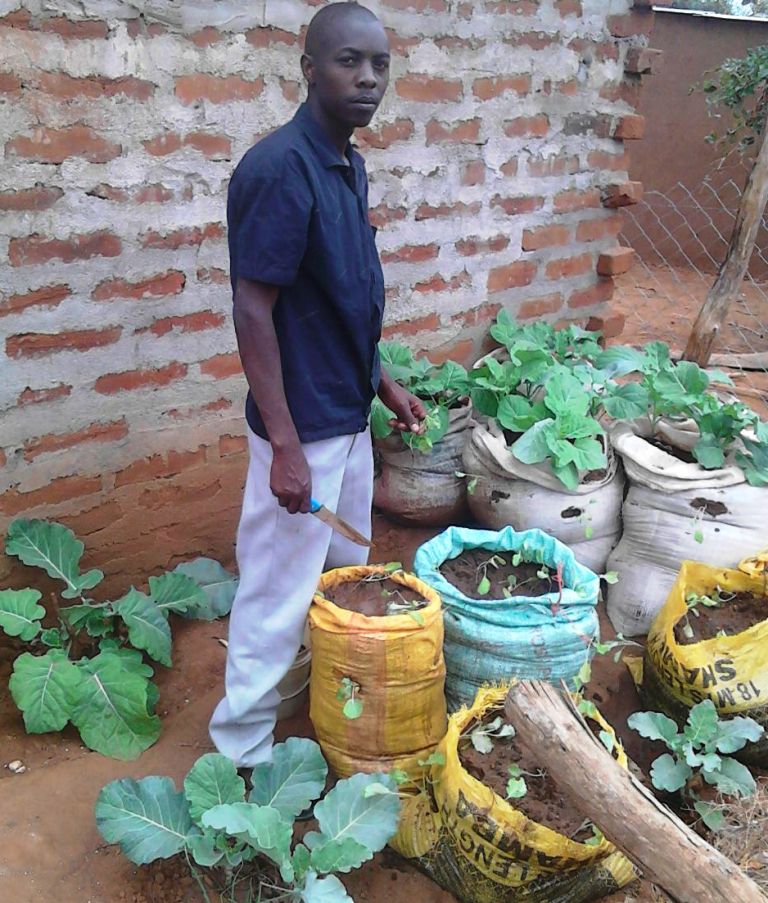
Narok County farmer Geoffrey Rono picks hay bales at his farm. Hay and silage are helping a Nyandarua County farmer maintain milk production this dry spell. Photo Courtesy.
As the country continues to lose livestock to the ongoing drought, one Nyandarua County farmer has maintained milk production with hay and silage, which he harvests and prepares at his farm in Kinangop.
Joseph Mbugua converts the hay into bales and fodder maize into silage, months ahead of every season.
The three cows consume about 40 litres of water per day and he gets about 20-25 litres of milk daily.
The farmer has more than 60 bales of hay which he hopes will take him through the remaining days of February and March 2017, before the April long rains.
Mbugua, who has three Friesians, said the unreliable weathers that affects growth of pastures like Napier grass drove him to a sustainable alternative of stored fodder.
“Although green feeds tend to have more milk than the dried ones, I have managed my cattle through this dry spell. The milk production has dropped by between three to five litres per day, but that is better off, than being without something or death,” he said.
Mbugua harvested the last batch of the hay in November, 2016. Usually, he cuts the fresh oat straws and rolls them into bales after drying under the shade for a day or two.
“Direct drying in the sun lowers the quality of the feeds because of the breakdown of the nutrient components. Drying reduces the moisture content for longevity in storage. Because of the compaction, the feeds may be infested by aflatoxins, which can poison the animals upon feeding if the moisture content is high,” he said.
One cow feeds on a bale of the hay per day. But in improving the quality of the total feeds, Mbugua offers locally made dairy meal together with silage mixed with purple vetch.
In this mix, hay consumption reduces to half a bale per day. The silage mix is a 20litre bucket measure. The molasses in the silage increase the appetite of the cows in feeding.
The maize fodder and molasses offer carbohydrates while the purple vetch and dairy meal adds proteins.
He sticks to the 70 per cent carbohydrate and 30 per cent protein and other mineral balance in feeding.
Because Napier grass does not perform well at his place, cabbage and kale leaves from farms help in supplementing the green feed requirement.
The oat straw hay takes between two and a half and three months to be harvested. From half an acre, the Mugumu Village farmer gets about 60 bales. But during sufficient rains, he harvests more than 80 bales.
Fodder maize is grown on half an acre.
READ ALSO: Molasses secures livestock silage for over a year for farmers
READ ALSO: Drought tolerant fodder maize gives eight tonnes per acre
READ ALSO: Farmer earns from hay as peers suffer maize and wheat losses
Mbugua and other dairy farmers in the Central Kenya region buy maize germ from suppliers from Uganda.
A 100kg maize germ- which is also rich in carbohydrates- costs him between Sh1,800 and Sh2,000, depending on the supply. He uses the germ to prepare the local dairy meal by adding sunflower seeds as protein sources.
For every 30kg of the maize germ, Mbugua adds five litres of the molasses.
“The resulting porridge-like liquid is rich in nutrients. The cows consume two litres per day. With such a mix of molasses in silage and the local meal, cows have increased appetite for even dry hay,” he said.
The purple vetch, which has between 16 per cent and 27 per cent crude proteins, is intercropped with fodder maize.
This not only saves on space, but helps in fixing nitrogen into the soil, besides controlling loss of moisture on dry weather and muting weeds.
Oats have about 20 per cent proteins, 4 per cent fats, 11 per cent crude fibre, potassium, manganese, phosphorus, calcium, zinc, among other minerals in various portions.
Although the current fodder maize prematurely dried up in the ongoing dry season, the farmer has prepared another piece of land for the next season.
“I am preparing more fields to grow hay, maize, and purple vetch for the next season. I must have a fodder that takes me through two months or more in advance. In case it fails to rain or snow falls,” Mbugua said.

















